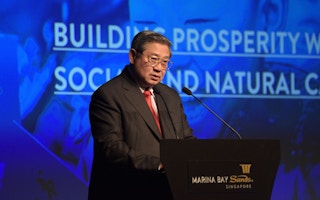Former Indonesian President Susilo Bambang Yudhoyono on Wednesday told 450 business leaders at the Responsible Business Forum on Sustainable Development that green growth is a “no-brainer” and urged them to put it into practice.
To continue reading, subscribe to Eco‑Business.
There's something for everyone. We offer a range of subscription plans.
- Access our stories and receive our Insights Weekly newsletter with the free EB Member plan.
- Unlock unlimited access to our content and archive with EB Circle.
- Publish your content with EB Premium.
“Governments must demonstrate political will, but business will play the critical, I would even say central role,’’ in fostering green growth and sustainability, he said.
Yudhoyono, who stepped down as Indonesia’s president in October and was recently appointed as chair of the Global Green Growth Institute (GGGI), told delegates that solutions to inequitable development and climate change already exist, but greater investments in green growth are required to implement these solutions at a larger scale.
GGGI is an international organisation headquartered in Seoul, South Korea, that aims to support emerging countries pursue green growth - which simultaneously targets economic performance, social inclusion, and sustainability - by assisting with development planning and providing policy knowledge.
Yudhoyono noted that prosperity is rising even as resources are becoming scarce, adding that sustainable, equitable growth that addressed this disparity has to be a cornerstone of the post-2015 development agenda.
Led by the United Nations, the agenda aims to define a framework that will succeed the UN Millennium Development Goals (MDGs), a set of eight global development targets which come to an end in 2015.
This agenda will be heavily influenced by the 21st annual United Nations Climate Change Conference, which will be held in Paris in 2015. Global leaders are expected to reach a universal and binding agreement on climate, with an overarching goal to limit the global temperature increase to 2 degrees Celsius above pre-industrial levels.
Yudhoyono called on governments to set ambitious targets for reducing emissions, introduce regulations that balance economic development with concerns such as environmental sustainability, food and energy security, and forest protection, and pledge funds to help poor and vulnerable regions improve their climate resilience.
“This will send strong signals to the business community,” said Yudhoyono, calling on corporate leaders to adopt sustainable practices in their own operations and focus on developing new technologies to maximise resource efficiency and reduce waste.
Also speaking at the forum, Yvo de Boer, director-general of GGGI, echoed the call for solutions to drive green growth. But he noted that governments and international organisations are finding it difficult to respond to sustainable development challenges such as eradicating poverty, finding the financing for green growth projects, and preparing for worsening climate change.
“
Choosing sustainable development over destructive economic development is a no brainer, but putting green growth into practice is a challenge.
Susilo Bambang Yudhoyono, chairman, Global Green Growth Institute
He pointed to an emerging dynamic between businesses, investors, and policy makers that was an more likely to spur progress on climate action than international negotiations between governments.
Businesses are becoming more proactive about adopting and reporting on sustainable practices, said de Boer, adding that investors had also begun to include environmental factors such as resource scarcity and natural disasters into their definition of risk, which guided their investment decisions.
In addition to businesses and investors, de Boer identified policymakers as the third point player in what he dubbed a “triangle of triumph”, stressing that governments needed to do more to support the development of innovative financing mechanisms and reporting methods.
“This triangle, with civil society in the middle, is where change will happen,” said de Boer.
Lory Tan, chief executive of WWF Philippines, observed that emphasis should be placed on helping communities adapt to climate change. He said that businesses and governments needed to implement major changes in the way their operations and investments were structured, rather than minor tweaks.
A key first step was to scale up investments in infrastructure as this would enable communities to adapt to long-term climate effects including rising sea levels and temperatures, floods, and droughts.
However, the threats resulting from climate change would vary geographically, said Tan, adding that decisions on adaptation and investment must be made locally.
As the world gears to adapt to a spike in population and resource demand, operating within the planet’s ecological limits will require creative solutions that restore stocks of natural resources, maximise resource usage, and capitalise on the economic opportunities in doing so, he said.
“Balanced growth that looks beyond financials and works within the budget of nature is what we should invest in,” he added.
Held at the Marina Bay Sands Expo and Convention Centre in Singapore, the forum gathered business leaders, NGOs and policy-makers from around the world to share practical solutions for sustainable and socially inclusive growth.














